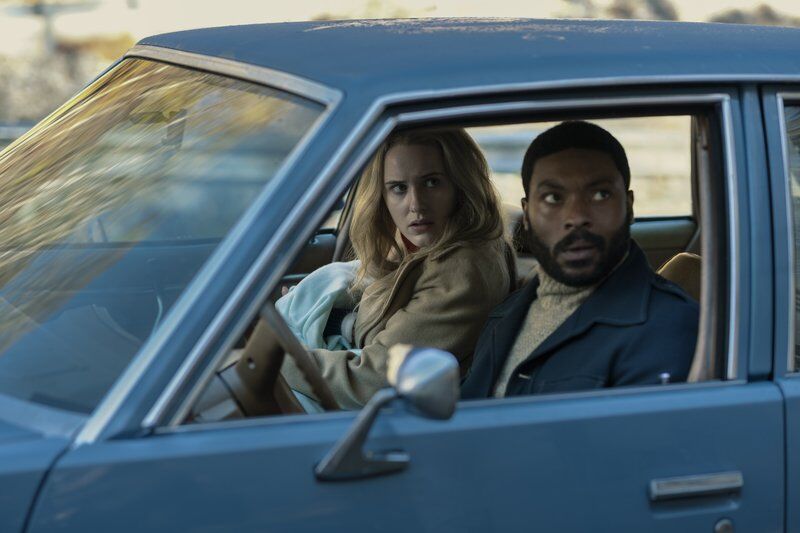In the main, the American indie scene of the past 40 years has been most keenly influenced by the Scorsese of Mean Streets: that's why there have been so many films in which men watch men hanging with other men, for better and worse. (This strand's dominance has been maintained by the insistent reissuing of Scorsese's most masculine endeavours: not just Mean Streets, but Taxi Driver and Raging Bull.) Julia Hart's new film I'm Your Woman feels like an attempt to channel Scorsese's feminine side, and the undercirculated Alice Doesn't Live Here Anymore in particular. Here is a 21st century indie that unfolds within a 1970s criminal milieu, but which finds a new way into and through it by focusing on a woman who's been left on the sidelines. That woman is Jean (Rachel Brosnahan), a housewife with no particular domestic skills who's literally left holding the baby - furthermore, a baby who isn't even her own - after her no-good crook of a husband is taken out of the picture one night. As she's forced out on the lam in the company of Cal (Arinzé Kene), the driver who's been assigned to her, we find ourselves watching a character study wrapped in a thriller, centred on a figure remodelling herself on the run. At an early juncture, Cal and Jean are woken up in their car by an apparently aggrieved patrolman, who's only appeased after our heroine spins the tall tale that her travelling companion is, in fact, her husband. "I didn't know I could lie like that!," Jean exclaims, as the pair of them (plus babe-in-arms) pull away once again. Yet people can, and people do; sometimes it gets them a little further up the road, and sometimes it gets them killed.
The story is a feminist one, but the element of crime gives it an edge that may just draw in film bros and unreconstructed boyfriends: Jean is trying to grow (and nurture another) at the exact point her life is most under threat. If I'm Your Woman describes any kind of liberation, it's a liberation more by default than choice. Brosnahan, who captured the global streaming audience's collective heart as the can-do heroine of The Marvelous Mrs. Maisel, is far more guarded here than she's ever been in her breakthrough TV role: she has some nicely twitchy scenes early on with a friendly neighbour (Marceline Hugot) who really just wants to welcome her to the area, and the payoff to this strand only confirms the character in her overriding cautiousness. The independence Jean earns is that which only follows when you can't trust anybody: in the hustle from one safe house to the next, she has to learn to stand on her own two feet, and then skedaddle further away from the city, out into the wilderness. En route, Hart makes smart, intuitive use of the AM radio playlist of the period. When Jean lets slip that she's been using her version of Aretha Franklin's "(You Make Me Feel Like) A Natural Woman" to get her adopted little one off to sleep, we realise - yup - that's the film's destination: getting its heroine to shed one ill-fitting, restrictive skin and feel comfortable in the next. To the film's credit, it's never quite as smooth a process as that signpost suggests, and so the outcome never entirely feels guaranteed.
Hart is sometimes a little self-conscious about her borrowings: in the early stages, there's at least one shot too many of a door being closed in Jean's face. (We get the reference immediately: tonight, we'll be watching The Kay Corleone Story.) Yet she already has many of the right instincts. The backstory here - Jean's maternal longings, her other half's fate - tends to come out in taut, nervy little bursts, only after the speaker has checked over both shoulders to ensure they're not being tailed. I also liked Hart's determination to keep that criminal element at arm's length - to make a different kind of crime movie, in other words, rooted more in character than action. I think that's why some critics have been thrown by the final-reel shift into James Gray-ish thrills and spills. But you can't say those car chases and shootouts haven't been set up: Hart and Brosnahan use the extra time this approach allows to finesse Jean's transformation from stay-at-home wife to self-standing frontierswoman, so that it feels organic rather than contrived. Long before the conclusion, someone who first presented as vaguely remote and anonymous - just another overlooked housewife in a cinema full of them - has come to life, and come to seem worthy of being the subject of an Aretha Franklin song. Instead of men watching men, for once we get an indie film by a woman who knows what she's doing about a woman gradually learning what to do. Around I'm Your Woman's midpoint, Jean sets her son down before the log fire she's just stoked in the woodland cabin the pair are hiding out in, and you can't miss the quiet pride in Brosnahan's voice as she states three simple words: "I did that." Given everything Hart has shown and told us about her heroine up to this point, it really does feel like an achievement - and a restart, and a Promethean passing of a flame, from a promising filmmaker to a newly capable and empowered heroine.
I'm Your Woman is now streaming via Amazon Prime.

No comments:
Post a Comment